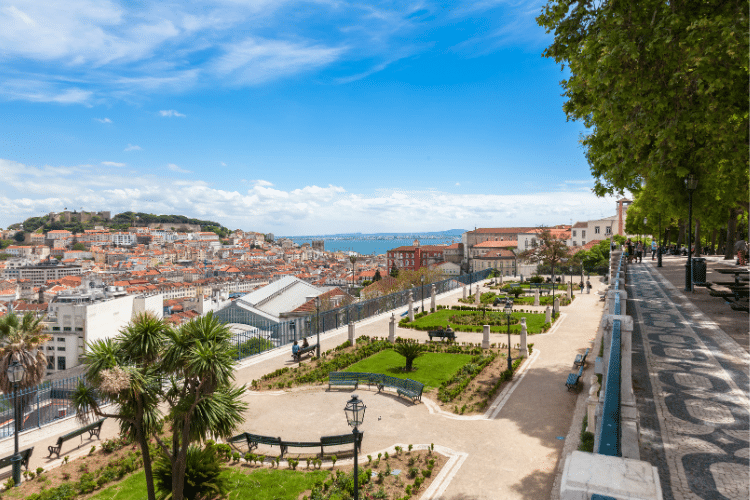Last Updated on December 11, 2024 by Maryam Siddiqui
Whether you’re looking to soak up the sun, immerse yourself in history and culture, or simply enjoy a slower pace of life, this country has something for everyone. Portugal is a vibrant country with a rich history, stunning natural beauty, and a laid-back lifestyle that attracts expats and tourists. Are you interested in making a move from South Korea to Portugal? Keep reading!

The idea of starting over in a completely different country may seem daunting, but don’t worry; Portugal is an exciting and welcoming place for expats. Over the years, the expat community has grown, which means that you’ll find other South Koreans living their dream lives here.
So how can you make the big move? What documents will you need, and how different is life in Portugal? Is the weather as harsh as in South Korea? What does public healthcare look like? We’ll answer all these questions and more. Happy reading!
How to move from South Korea to Portugal
While relocating can be exciting, it requires careful planning and preparation. This article covers all you need to know, from the Visa application to the general documentation needed, so sit back, relax, and continue reading.
Before we begin, you should know that the culture can be very different from South Korea. So it is essential to research and learn about Portugal’s culture, language, and lifestyle.
It may help to know that Lisbon, Porto, and the Algarve are popular living choices among expats. This is especially true for those who wish to work. Whether you wish to work here or retire, we’ll discuss housing and living costs in detail later.
Needless to say, you should also obtain the necessary paperwork before you move from South Korea to Portugal. You’ll need a valid Passport and Visa to enter Portugal and a work permit, residency permit, or other documentation for your extended stay.
How can I apply for a Portugal Residence Visa from South Korea?
First up – gathering all necessary documents!
Your Passport, proof of income, and proof of health insurance should be with you before you schedule an appointment at the Portuguese embassy or consulate in South Korea. You can find a comprehensive list of required documents on their official website.
Next, you will submit your application and all the required documents in your scheduled appointment, along with the fee, which is usually €90. Once your application is submitted, you’ll need to wait for a decision which can take several weeks or even months.
Once your application is approved, you’ll receive a Portugal Residence Visa, allowing you to stay in Portugal for an extended period. That’s your permit to the country as a non-EU expat.
It is advisable that expats check with the Portuguese embassy or consulate in South Korea for specific requirements, especially because of the time-consuming and confusing process. In case you’re getting confused, Viv Europe can help you figure things out at your own pace.
What are the types of Portugal Residence Visa that Koreans may apply for?
There are various options available that expats can apply to. One such choice is the Passive Income Visa. This is popular among Koreans who have sufficient support and wish to reside in Portugal without engaging in any kind of work activity. It’s basically the Visa retirees apply for.
You may also apply for a Student Visa if you wish to study in Portugal or a Work Visa if you have a job offer in Portugal. There is also a Family Reunification Visa for those who have family members already living in Portugal and wish to join them.
The other famous Visa is the D2 Business Visa, which enables South Korean business owners and entrepreneurs to launch operations in a central European market. Portugal has gained popularity as Europe’s Silicon Valley, with numerous emerging corporations and excellent infrastructure to develop a business.
Documentation needed in general
If you want to move from South Korea to Portugal, you need documents that act as your entry key. It’s important to note that different Visa applications require different documents. For example, for the D7 Visa, you must show proof of sufficient passive income. And for the D1 Work Visa, you’ll need to have an official contract with a Portuguese company.
A general list of documents is listed below:
- Valid Passport;
- Signed Visa application form: South Korean nationals will need a Visa to stay in Portugal for more than 90 days. The Visa application process can take several weeks, so it is important to start early;
- Proof of livelihood and accommodation in Portugal;
- Criminal Records Certificate issued by your country of origin (and other recently visited countries);
- Health Insurance: You should obtain health insurance before moving to Portugal to ensure you are covered in case of illness or injury;
- Permission to consult the Portuguese criminal registry by AIMA (formerly SEF);
- Driving License: If you plan to drive in Portugal, you only need this.

Obtaining a Residence Permit to live in Portugal from South Korea
The process for obtaining a Residence Permit in Portugal can vary based on your individual circumstances. But, generally, it involves applying through the Portuguese embassy or consulate in South Korea.
As mentioned earlier, you’ll need a valid Passport, financial proof to support yourself, and a potential job offer or proof of self-employment. You may also need to provide a criminal record check and medical certificate.
Once you have obtained your Residence Permit, you will need to obtain a Portuguese Tax Identification Number (NIF). NIF is required to legally work or conduct business in the country and can be obtained through the Portuguese tax office.
- The NIF Number is also needed to open a bank account in Portugal. To know more, check out our article Top 4 Best Banks In Portugal For Expats To Open Accounts.
What is the cost of living in Portugal compared to South Korea?
Now that we have gone over permits, let’s talk about living in Portugal. Portugal can be much more cost-effective to live in than South Korea. But, of course, the cost of living can vary depending on the specific location and lifestyle choices.
For example, consumer prices in Lisbon are 31.0% lower than in Seoul, and groceries in Lisbon are 54.8% lower than in Seoul. On average, if you are renting in both areas, you’d need around €3,703 (₩5,360,411) in Lisbon to maintain the same standard of life that you can have with €4,622 (₩6,700,000) in Seoul.
Check out a comparison between the two countries as a whole:
| Expenses | Costs in Portugal | Costs in South Korea |
|---|---|---|
| A single person estimated monthly costs (without rent) | €593 (₩858,768) | €896 (₩1,298,891) |
| Family of four estimated monthly costs (without rent) | €2,065 (₩2,990,485) | €3,238 (₩4,690,472) |
| Average 1-bedroom residence rent | €774 (₩1,122,302) | €444 (₩643,127) |
| Average 3-bedroom residence rent | €1,312 (₩1,900,895) | €1,308 (₩1,895,199) |
| Basic Utilities (Electricity, Heating, Cooling, Water, Garbage, Internet) | €112 (₩162,260) | €138 (₩200,913) |
Estimates are from Numbeo (as of April 2023).
How much is the rent in Portugal?
While the overall cost of living is lower in Portugal, you should be aware that rent is generally slightly higher than in South Korea. Of course, this varies based on which city you decide to live in.
The average rent for a one-bedroom apartment in Lisbon is €778 (₩1,127,767) per month, while the average rent for a one-bedroom apartment in Seoul is €510 (₩739,710) per month. But if you choose Porto, then rent prices in Seoul are 31.4% higher than in Porto.
But the good news is that there are many options and you can choose the perfect city for you as per your budget and lifestyle!
Let’s Move to Europe
With Viv Europe your plans for Europe will come to a reality
What are the best places to live in Portugal?
From the stunning coastline in Faro to the picturesque countryside in Braga, there are plenty of cities you can live in Portugal.
Lisbon is one of the larger cities, with about 500,000 inhabitants. It’s known for its job opportunities, overall low living cost, and excellent quality of life. It is perfect if you wish to lead a working lifestyle on a budget. Lisbon also offers exciting nightlife, which makes it a good choice if you like to stay out late and have fun.
If you seek a relaxed and comfortable lifestyle, Porto is a great city option for you. It has a population of just over 200,000 people and is a popular destination for tourists and expats alike. The city’s rich history, world-renowned wine, and mild climate make it an attractive home for culture-loving people who crave a laid-back lifestyle.
Funchal is a completely different spot from the city-like areas in Portugal. Located on the island of Madeira, it’s a smaller city with a stunning natural setting of breathtaking mountains. Funchal has a rich cultural heritage, with many festivals and events taking place throughout the year. It can be your dream home if you want a life away from the hustle and bustle of the larger cities.
Where do Koreans usually live in Portugal?
Most of the Korean community resides in Lisbon. But, there are also small Korean communities in other cities such as Porto and Coimbra.
In Lisbon, particularly areas of Alameda, Areeiro, and Saldanha are popular among South Koreans. These areas are relatively close to the Korean embassy, Korean restaurants, and supermarkets that carry Korean food products.
Another area that is gaining popularity among Korean expats is Parque das Nações. This is a modern neighborhood built for Expo 98, which offers easy access to transportation and various amenities.
While no designated Korean community exists in Portugal, Korean expats tend to settle in areas with easy access to amenities and services that cater to their needs.
How is the Portuguese Economy?
While the Portuguese economy does well, it still falls a bit behind Korea’s. According to official data, South Korea had a GDP of $2.34 trillion in 2022, while Portugal’s GDP was $371 billion. Of course, we must take into account that the two countries are developing at different paces.
South Korea is also known for its technological advancements and is home to several global technology companies, whereas Portugal’s economy is more focused on tourism, agriculture, and manufacturing. Nonetheless, job opportunities in the tech industry are on the rise in Portugal, thanks to advancements!
Both countries face different economic challenges and opportunities, so the economy should not be a reason to stop you from your move from South Korea to Portugal.
Is Portugal safe?
Yes, it is a safe country for both expats and tourists alike. Portugal ranks as the 6th safest country in the world and has a low crime rate, with rare violent crimes. Still, in case of any mishap, Portuguese helplines are always available, and citizen safety is a top priority. On the same index, South Korea ranks 43rd safest.
There are still certain areas in Portugal that are safer than others, so choose your city carefully. As a personal responsibility, you should also be vigilant in public spaces, particularly in larger cities and tourist hotspots.

What is public healthcare like in Portugal for South Korean expats?
Expats have the same public healthcare services as Portuguese citizens. But they must have a valid residency permit or be registered as citizens. The public healthcare system in Portugal, the SNS, offers universal coverage to all legal residents in the country, including expats.
Several public hospitals and health centers in Lisbon provide medical care to expats. Some of the top hospitals in Lisbon include Hospital da Luz, Centro Hospitalar de Lisboa Central, and Hospital de Santa Maria.
These are generally well-equipped and staffed with highly trained medical professionals, so you don’t need to worry about your health being compromised in Portugal. They also provide services in English to cater to international patients.
Still, you should know that while public healthcare in Portugal is generally of a high standard, waiting times can sometimes be long, especially for non-emergency treatments. But you can always go for private health insurance, which can provide quick access to medical care and more personalized services.
What is the weather like in Portugal?
When you move from South Korea to Portugal, you may find the weather to be warmer than what you are used to. With a Mediterranean climate, Portugal experiences mild winters and hot summers generally.
For example, Lisbon and Porto have mild winters with temperatures averaging around 15°C, while summers can be quite hot with temperatures ranging from 25°C to 35°C.
But there are colder regions in Portugal, like the Serra da Estrela or Bragança, so you can choose the area where you feel more comfortable.
Take a look at temperatures in different seasons:
| Country | Spring | Summer | Autumn | Winter |
|---|---|---|---|---|
| Portugal | 15.4 ºC (59.72 ºF) | 22.4 ºC (70.52 ºF) | 18.1 ºC (64.58 ºF) | 11.8 ºC (53.24 ºF) |
| South Korea | 4.2 ºC (39.6 ºF) | 24.8 ºC (76.6 ºF) | 5.8 ºC (42.4 ºF) | -3.5 ºC (25.7 ºF) |
Data from the Climate Data website.
What are the benefits of moving from South Korea to Portugal?
If you’re exhausted from your fast-paced South Korean life, you may find the Portuguese relaxed lifestyle to match your requirements. Plus, it offers a high quality of life at a relatively low cost, as you could tell by the topics we discussed.
A major benefit of Portugal is its emerging tech market, strategic business location, and public healthcare, which is open to even expats. Also, its affordable housing options and mild climate can be appealing if you don’t enjoy the harsh Korean winters.
Last but not least, the country’s strong sense of community makes the expats feel welcomed and included in local events and activities. On a side note, Portugal has a rich cultural heritage and a strong food and wine culture that you will thoroughly enjoy exploring in your free time.
When are you moving to Portugal from South Korea?
That sums up everything a new expat needs to know to move from South Korea to Portugal! Take your time to research things in detail, read more blogs on our website, and talk to other South Korean expats who have made the same decision.
To get answers to your questions, get first-hand information from expats on our Facebook Group – All About Portugal For Expats. We’re a community of over 14,000 Portugal enthusiasts waiting to help you out.
Despite all the help you can get on the internet, sometimes you need professionals to guide you throughout. Consult relocation experts at Viv Europe and let them deal with the bureaucracy so you don’t have to! You’re only a few steps away from living your dream life in Portugal!





